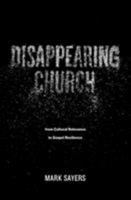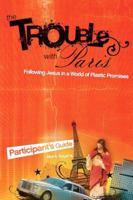The Trouble with Paris: Following Jesus in a World of Plastic Promises
Doesn't everyone want the good life these days? Our shopping mall world offers us a never-ending array of pleasures to explore. Consumerism promises us a vision of heaven on earth-a reality that's hyper-real. We've all experienced hyperreality: a candy so 'grape-ey' it doesn't taste like grapes any more; a model's photo so manipulated that it doesn't even look like her; a theme park version of life that tells us we can have something better than the real thing. But what if this reality is not all that it's cracked up to be? Admit it, we've been ripped off by our culture and its version of reality that leaves us lonely, bored, and trapped. But what's the alternative?
In The Trouble With Paris, pastor Mark Sayers shows us how the lifestyles of most young adults (19-35) actually work against a life of meaning and happiness to sabotage their faith. Sayers shows how a fresh understanding of God's intention for our world is the true path to happiness, fulfillment, and meaning.
Customer Reviews
Rated 5 starsI Underestimated the Impact of Consumerism on My Life
For years I have observed the insidious pull of materialistic consumerism on my life and have certainly recognized it in the lives of others. This book, however, helped bring a new level of understanding to me and articulated the nature of hyperreality to me in a way that brought a new level of clarity to it's destructive nature. I'm now seeing the reality of hyperreality.
0Report
Rated 5 starsA Must-Have for Anyone Influenced by Consumerism (That's Every American)
We often live in light of the statement, "I will be happy when..." Being immersed in Western culture, we can't deny the heavy influence of consumerism on our lives. In The Trouble with Paris DVD study, Mark Sayers communicates relevant truth to teens, young adults, and adults across the board in way I've never seen before. Filled with trendy and engaging motion graphics and video, Mark hits on three main points when it comes...
0Report
Rated 5 starsInsightful must read
Essential read for anyone wanting to understand what it means to be an authentic follower of Jesus in the midst of western young adult culture today. Even more startlingly relevant considering recent financial crisis. A brilliant, sharp and concise book to read yourself, and give to young adults everywhere...
0Report
Rated 5 starsWonderful
Mark Sayers' new book The Trouble with Paris is outstanding. Well informed, insightful, articulate, and down to earth are just a few thoughts that come to mind when describing this tour de force. Sayers has a unique ability to have his finger on the pulse of contemporary culture and Christianity, and proves to be a capable guide through the thickets of that which is counterfeit and fake. Today we're submersed in the media...
0Report
Rated 5 starsProfound and timely
I love Mark Sayers and I love his book. This is one of the best analyses of the cultural situation of Gen-Y in particular, and of the West in general. Spiritual penicillin for our cultural malaise.
0Report




























